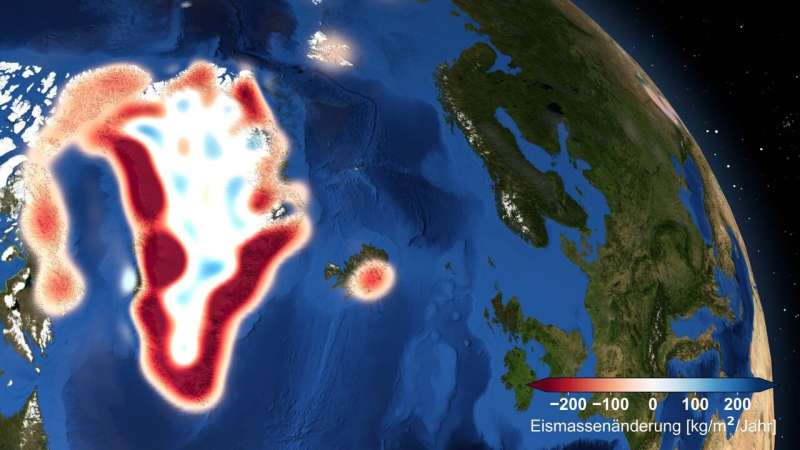The graphic shows the ice-sheet loss in Greenland – based on GOCO06S. Credit: IFG – TU Graz
The Earth's gravity fluctuates from place to place. Geodesists use this phenomenon to observe geodynamic and climatological processes. Using satellite-supported recordings, they document the strong fluctuations and the associated spatial and seasonal distributions of mass on and in the Earth. From this, gravity field models can be calculated by which researchers can track rising sea levels or melting glaciers, investigate regional groundwater reserves more closely or analyze oceanic currents.
A team at the Institute of Geodesy of TU Graz has published a new combined gravity field model. The model, which is called GOCO06S, represents changes in mass on and under the Earth's surface at unprecedented accuracy.
Model brings together different measuring processes
The name refers to the initiative itself: Gravity Observation Combination (GOCO), in whose framework the model was developed together with international partners. The consortium combines 1.16 billion measurements recorded by 19 satellites. "Due to the combination of data, the strengths of the individual measurement methods can be taken advantage of to the best of our ability. This makes it possible for us to detect changes in the gravity field on a scale of one millionth of the mean force of gravity [Note: 9.81m/s2]," explains Torsten Mayer-Gürr, head of the Working Group of Theoretical Geodesy and Satellite Geodesy at TU Graz's Institute of Geodesy. To achieve consistent global accuracy, it was decided to do without terrestrial data. Compared to the previous model, results have been improved by 25 percent.
The working group is occupied with determining the temporal changes in the Earth's gravity and the evaluation of gravity measurements. The Graz team processes data from satellite missions and makes available gravity field solutions to the scientific community. "Our models are also used, for instance, in research into flood events," says Mayer-Gürr, naming one particular field of activity.
More information: Gravity Field models at IFG: www.tugraz.at/institute/ifg/do … ravity-field-models/
Provided by Graz University of Technology






















